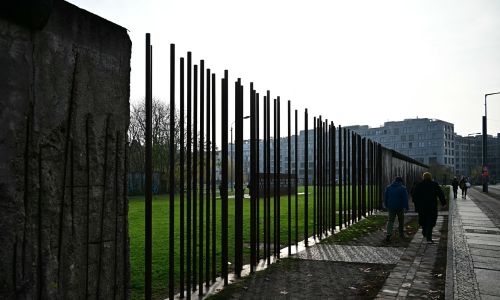Germany marks 1989 Berlin Wall fall with ‘Preserve Freedom’ party
AFP | Berlin, Germany
The Daily Tribune – www.newsofbahrain.com
Email:editor@newsobahrain.com
Germany marked 35 years since the Berlin Wall fell with festivities on Saturday under the theme “Preserve Freedom!”, against the somber backdrop of war in Gaza and Ukraine, and fears that democracy is under attack around the world. The liberal ideals of 1989 “are not something we can take for granted”, Chancellor Olaf Scholz said on Friday, just days after the his governing coalition collapsed.
“A look at our history and at the world around us shows this,” added Scholz, whose three-party alliance imploded the day Donald Trump was re-elected US president, plunging Germany into political turmoil and towards new elections.
November 9, 1989, is celebrated as the day East Germany opened the borders to the West after months of peaceful mass protests, paving the way for German reunification and the collapse of Soviet Communism.
That “joyful day” underlines the sombre fact “that freedom and democracy have never been a given”, Berlin mayor Kai Wegner told a commemoration service at the Berlin Wall Memorial on Saturday. One Berliner who remembers the momentous events, retiree Jutta Krueger, 75, said it was “a shame” Germany’s political crisis had erupted just before the anniversary weekend.
“But we should still really celebrate the fall of the Wall,” she said, hailing it as the moment East Germans could travel and “freedom had arrived throughout Germany”.
Saturday’s event at the Berlin Wall Memorial, which was attended by President Frank-Walter Steinmeier, honoured the at least 140 people killed trying to flee the Russian-backed German Democratic Republic (GDR) during the Cold War.
The fall of the Berlin Wall -- symbol of the Cold War and the division between an Eastern and a Western Bloc -- contributed to the collapse of Communism in eastern Europe and the reunification of Germany a year later.
The 155-kilometre “wall of shame” was erected around West Berlin in 1961 to end an exodus of citizens from the Western Bloc enclave in Communist East Germany. Most East Germans are grateful the GDR regime ended but many still have unhappy memories of the perceived arrogance of West Germans, and resentment lingers about a remaining gap in incomes and pensions.
These sentiments have been cited to explain strong support for the farright Alternative for Germany (AfD) in eastern Germany, and for the Russia-friendly, anti-capitalist BSW.
Related Posts

